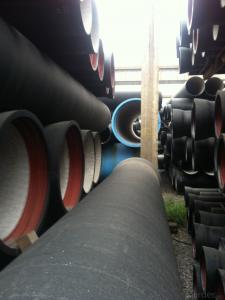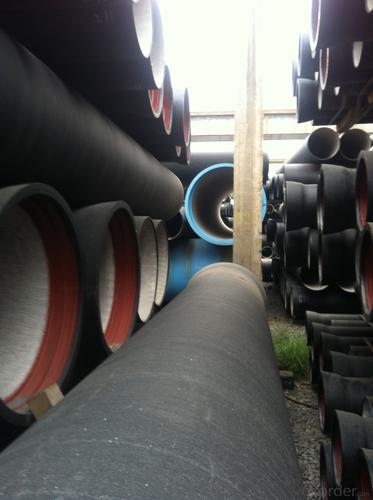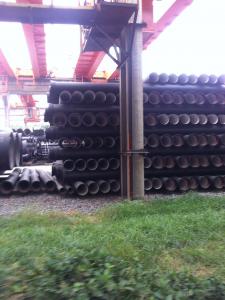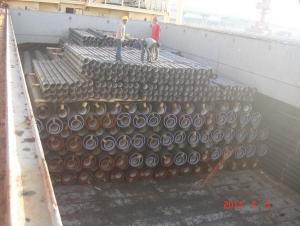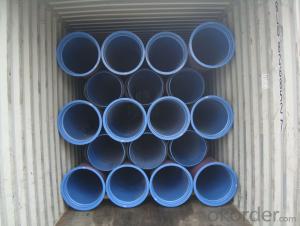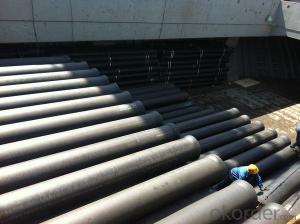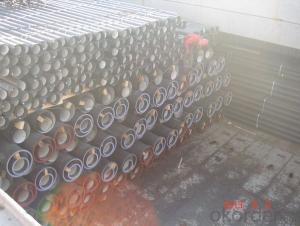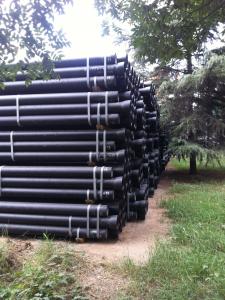DUCTILE IRON PIPES AND PIPE FITTINGS K8 CLASS DN1100
- Loading Port:
- Tianjin
- Payment Terms:
- TT OR LC
- Min Order Qty:
- 22 pc
- Supply Capability:
- 3000 pc/month
OKorder Service Pledge
OKorder Financial Service
You Might Also Like
Material : Ductile Cast Iron
Size Range : DN 80mm to DN 2000mm
Unit Effective Length : 6m or 5.7m
Manufacture Standard: ISO 2531:1998/ EN 545:2006/EN 598:2007
Annual capacity : 200,000 tons
Coating Exterior: Zinc 130g/m2 according to ISO 8179-1 and bitumen coating 70 microns.
Cement Interior: Portland Cement/ High Alumina Cement/ Sulphate Resisting Cement Lining according to ISO 4179
Special requirements on external coating and internal lining can be applied
We also provide accessories such as SBR/EPDM rubber gaskets, lubricant paste, pipe caps, PE sleeves, etc.
Additional Parts:
Each pipe is strictly inspected according to related standard to ensure permanently high performance.
Easy Installation at site and service free for life
Long Service Lifespan
Quotation will arrive you within 24hours once we get your inquiry.
We guarantee offering you a competitive price.
A copy of original inspection reports of pipes will be offered after shipment.
Photos of loading process will be sent to the customer after shipment effect.
We will follow-up the delivery progress after shipment effect and update to the customer on weekly basis.
- Q: How are ductile iron pipes protected against external soil loads?
- Ductile iron pipes are protected against external soil loads through a combination of proper installation techniques and the use of protective coatings. The pipes are installed in a manner that allows for adequate support and backfilling, which helps distribute the external soil loads evenly. Additionally, these pipes are often coated with materials such as epoxy or polyethylene to provide a barrier between the pipe and the surrounding soil, preventing corrosion and damage from external forces. This protective coating ensures the longevity and durability of ductile iron pipes in underground applications.
- Q: Can ductile iron pipes be used in agricultural applications?
- Ductile iron pipes are indeed suitable for agricultural applications. They possess exceptional strength and durability, rendering them appropriate for a range of agricultural purposes. These pipes find utility in irrigation systems, water supply pipelines, and drainage systems within farms and agricultural fields. Given their resistance to corrosion and long lifespan, ductile iron pipes are essential for agricultural applications that involve exposure to various environmental factors and chemicals. Moreover, the pipes' ability to withstand high-pressure water flow makes them ideal for transporting water for irrigation purposes. In summary, ductile iron pipes are a dependable and efficient choice for agricultural applications due to their strength, durability, resistance to corrosion, and capacity to handle high-pressure water flow.
- Q: Can ductile iron pipes be used for slurry transportation?
- Yes, ductile iron pipes can be used for slurry transportation. Ductile iron pipes are known for their high strength and durability, making them suitable for various applications including slurry transportation. Slurry is a mixture of solid particles and a liquid, which can be abrasive and corrosive. Ductile iron pipes have excellent resistance to abrasion, corrosion, and erosion, making them capable of handling the challenges posed by slurry transportation. Additionally, ductile iron pipes offer a smooth inner surface, reducing friction and improving the flow of slurry. Therefore, ductile iron pipes are a reliable choice for slurry transportation systems in industries such as mining, wastewater treatment, and oil and gas.
- Q: What is the expected bedding and backfill requirements for ductile iron pipes?
- To ensure the longevity and proper functioning of ductile iron pipes, it is crucial to meet the expected bedding and backfill requirements. Although these pipes are known for their durability and strength, careful installation is still necessary to prevent any potential damage or compromised performance. The bedding requirements for ductile iron pipes entail establishing a stable and uniform support system to distribute the loads and stresses from the surrounding soil. The pipe should be surrounded by a bedding material that is devoid of rocks, debris, or any sharp objects that could potentially cause harm. Moreover, the bedding material should be adequately compacted to prevent settlement or shifting, which could result in misalignment or pipe failure. Typically, a granular material such as sand or fine aggregate is employed as the bedding material for ductile iron pipes, with a minimum thickness of 6 inches. This material should be evenly placed beneath and around the pipe to provide a continuous support system. Additionally, it should be compacted to at least 90% of the maximum dry density to ensure proper stability and load distribution. As for the backfill requirements, they pertain to the material used to fill the remaining space around the pipe after the bedding has been installed. Similar to the bedding material, the backfill material should be free from rocks, debris, or sharp objects to prevent damage. It should offer support and protection to the pipe while allowing for proper compaction and settling. The backfill material for ductile iron pipes typically consists of a granular substance such as sand or fine aggregate, with a maximum particle size of 1 inch. It should be placed and compacted in layers, ensuring that the compaction is uniform and even around the pipe. Sufficient compaction is crucial to avoid settlement or shifting of the backfill material, which could potentially harm or misalign the pipe. In conclusion, meeting the expected bedding and backfill requirements for ductile iron pipes necessitates the use of a granular material that is free from rocks, debris, or sharp objects. This material should be evenly placed and compacted to provide stable support and protection to the pipe. Adhering to these requirements will help ensure the proper functioning and longevity of ductile iron pipe systems.
- Q: Can ductile iron pipes be installed outdoors?
- Ductile iron pipe is a kind of cast iron. It is an alloy of iron, carbon and silicon.
- Q: What is the average diameter range of ductile iron pipes?
- The diameter of ductile iron pipes can vary depending on the application and industry standards. In general, there is a wide range of diameters available to meet different requirements. Ductile iron pipes can start from as small as 4 inches (100 mm) and go up to 64 inches (1600 mm) or even larger. These sizes are commonly used for water distribution, sewer systems, and infrastructure projects. It is important to consider factors such as local regulations, project specifications, and engineering considerations when determining the appropriate diameter range. Consult industry standards and relevant authorities for specific applications.
- Q: How does ductile iron pipe compare to steel pipe in terms of durability?
- Ductile iron pipe and steel pipe both have their own unique characteristics, but in terms of durability, ductile iron pipe has several advantages over steel pipe. Firstly, ductile iron pipe is highly resistant to corrosion. It has a protective layer of zinc or cement lining that prevents rust and corrosion, making it more durable and less prone to leaks or failures. On the other hand, steel pipe is susceptible to corrosion, especially when exposed to moisture or certain chemicals. This can lead to structural issues and decrease its overall durability. Secondly, ductile iron pipe has excellent impact resistance. It can withstand heavy loads and external pressures without cracking or breaking. This makes it suitable for applications in areas with high traffic or where the pipe may be subject to accidental impacts. Steel pipe, although strong, can be more brittle and prone to fractures under similar conditions. Additionally, ductile iron pipe has a longer service life compared to steel pipe. It has been known to last for over 100 years with proper maintenance, making it a reliable and durable choice for infrastructure projects. Steel pipe, while still durable, may require more frequent inspections and maintenance to ensure its longevity. Overall, ductile iron pipe surpasses steel pipe in terms of durability due to its corrosion resistance, impact resistance, and longer service life. However, the choice between the two ultimately depends on the specific application, budget, and other project requirements.
- Q: If the ductile iron pipe is broken, can we use rush repair?
- In this way, manpower, material resources and financial resources can be saved, time can be saved, and unnecessary troubles to the citizens' water supply can also be reduced.
- Q: Can ductile iron pipes be made of flexible waterproof sleeves?
- The casing can be divided into ordinary casing to be 2-4 cm thick than the pipe to be used and fixed to the wall or plate, and the pipe passes through it. Flexible bushing - between the casing and pipe, with flexible material to seal the sealing effect. Rigid casing - that is, between the casing and pipe with rigid material sealed to achieve sealing effect. Waterproof casing - is the use of the casing of the environment is to prevent liquid leakage or leakage into place (such as the pool, septic tanks, basement, etc.) is on the outer wall of the bushing is not less than 1 times increase waterproof wing, this wall is poured in the casing as a whole, not because of swelling shrinkage factor and crack and leakage.
- Q: Can ductile iron pipes be repaired if they get damaged?
- If ductile iron pipes sustain damage, it is indeed possible to repair them. To carry out the repair, the first step involves identifying the specific section of the pipe that has been damaged, followed by assessing the extent of the damage. In the case of minor damage, there are several techniques available for repair, including welding or applying epoxy lining. However, if the damage is more severe, it may be necessary to replace certain sections of the pipe. Professionals who specialize in pipe repair possess the necessary skills and equipment to accurately identify and effectively fix damaged ductile iron pipes, thereby guaranteeing their ongoing functionality and durability.
Send your message to us
DUCTILE IRON PIPES AND PIPE FITTINGS K8 CLASS DN1100
- Loading Port:
- Tianjin
- Payment Terms:
- TT OR LC
- Min Order Qty:
- 22 pc
- Supply Capability:
- 3000 pc/month
OKorder Service Pledge
OKorder Financial Service
Similar products
Hot products
Hot Searches
Related keywords
